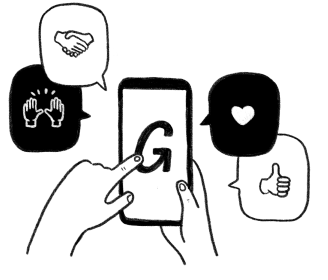How To Recover From a Fibromyalgia Flare-Up
Recovering from a fibromyalgia flare requires insight and preparation. When your symptoms intensify, seemingly out of nowhere, it can be mentally and physically overwhelming and super stressful. You're probably in for a bumpy ride. Flares can last for a few days to a few weeks and one thing is for sure, there is never a good time to have one. But, flares can be eased by managing your energy and stress levels with some proven techniques and learning more about your triggers. There is an old saying “Failing to plan is planning to fail” and so it's great to know what to do when fibromyalgia flares up, be prepared. In this article, we show you how to take a girls scout approach to recover from a fibromyalgia flare.
Recognize that flare ups come with big feelings
When a flare up strikes, it usually comes with a flurry of unwanted emotions. For me, flare ups meant a heavy sense of guilt - blaming and shaming myself. I would default to believing the flare up was all my fault and I was letting people down. Often there was an unhealthy dose of ‘shoulds’ in there too - I should be better at this, I should have done this (or I should not have done that), I should be stronger. This quickly spiraled into a tear-filled meltdown that just made my pain worse. Disappointment is understandable when flares throw a spanner in your plans, but rather than battling with emotions, recognizing and acknowledging them tends to bring a little ease and calm. Rather than spending time getting all caught up in the ‘why?’, the important thing is the “what now?”.
Give yourself permission to rest
Now that you've acknowledged the emotions, maybe even had a good ugly cry (I have always found this can help!), it’s time to give yourself some permission to rest. A flare is a time to take a break from the everyday and shift to intentional rest. This is not lazy or self-indulgent. It is exactly what your body needs and, based on what we hear from the fibro warriors out there, dedicated recovery time will get you through the flare quicker. So, clear your schedule for a few days if you can, don't even try pushing through it!
Reduce stress
During a flare, any activity that can help to bring some balance to your nervous system is going to help. You want to aim to shift from a sympathetic response (fight/flight/freeze stress response) to a parasympathetic response (rest/digest/soothing). Any activities that promote a sense of comfort, support and safety. These might include meditation, deep breathing, reading, bingeing your favorite feel-good show, coloring, jigsaw puzzles, bath, heat/cold packs, using mobility or functional aids, acupuncture, massage, talking with trusted friends/therapists, hot packs, aromatherapy, music…whatever works best for you. And that even might mean putting some of your normal pain management strategies (like somatic tracking which is best done during low to medium pain) to the side, just for now.
Keep moving
When a fibro flare comes around, you probably will feel like curling up in bed, under the covers and not moving all day long. But trying small and gentle movements such as light stretches, yoga, or short walks can be helpful in alleviating symptoms. Something little is better than nothing. And, added benefit, research suggested there are significant mental health benefits from being physically active, so keeping moving can help regulate your mood through the challenge of the flare1.
If you can manage to get outside in nature and expose yourself to some sunshine even better. Maybe your regular exercise regime might be too taxing during a flare up so you could decrease or modify it. Remember, that once your flare has passed you can begin to slowly increase your activity amount and intensity again.
Knowledge is power

Pacing daily activities
For a little while, it’s crucial you avoid overdoing it. You may need to ease back on your daily activities, taking more frequent breaks and even offloading some of the tasks (including taking a break from paid work if it's a possibility). Bring everything down a notch and do less. Is there a way to evaluate your daily tasks and chunk them down into manageable pieces, incorporating more frequent rests between activities? There is a temptation during flares to just cancel everything. If you can take a pacing approach you can still participate and keep contributing, just modified to help get you through the flare.
Set boundaries
Undertaking helpful activities when you have a pain flare might mean canceling or changing some plans. While it isn't easy, it is okay to say no. You may feel like you are letting people down, but setting strong boundaries will help you recover from the flare quicker. I like to plan what I’m going to say in advance. My go-to is ‘I’m sorry my pain is really bothering me right now and I’m going to have to….[insert what I need] so I’m afraid I can’t [what I had planned/been asked to do]’. In a similar way, if you need help with daily activities or re-arranging schedules, don't be afraid to rally the troops. Be specific and ask for help.
Drink water & eat clean
For me, when pain flares I crave comfort food and it's never the healthy stuff. I’m talking carbs and sugar! But my symptoms will ease faster if I resist and stick to clean eating and staying hydrated. Certain foods (such as gluten, sugar and MSG) can make symptoms worse due to their influence on the immune system while low calorie, healthy fats and the Mediterranean diet can help reduce fibromyalgia symptoms. When a pain flare comes, the simpler the better. Maybe you can rely on some healthy meals from the freezer or you could put the call in to a friend/family member to help out.
Talk about it
Sharing your experience with an empathetic ear might be a way to provide comfort when you’re finding fibro flare symptoms challenging. Perhaps you could book a session with a trusted therapist, talk to loved ones or share with someone who “gets it” like a friend or other people living with pain. If you would like an online community for support - join our Living well with Fibromyalgia Facebook community.
Medication as an enabler
Talk to your pharmacist, but it’s generally okay to use medications for flare-ups. If they work for you, using them in the short-term, in a medically approved manner may help. You’re not weak for taking them, and you don’t get a bravery award if you don’t. If possible, decide ahead of time how much you will take, when, and for how long, and stick to that plan and then re-evaluate at the end. Medication may be a useful enabler to help you try the other flare up recovery techniques suggested in this article.
Practice self-compassion
Let’s imagine for a moment that your best friend, or a loved family member is having a pain flareup. What would you say to them? What might you offer them as support and comfort? Could you turn some of that same compassion towards yourself? Self compassion is a valuable coping strategy and helps calm an activated nervous system.
Investigate and note your fibromyalgia flare up triggers
Maybe after your symptoms have eased, you could note the things that might have contributed to the flare up, but be kind to yourself too and accept that you can’t change the past. Learning more about your triggers and finding ways to avoid or minimize them can actually help reduce the frequency and severity of fibromyalgia flare ups.
Recover from a fibromyalgia flare...like a girl/boy scout!
So, you’ve read this article now it's time to tailor make your own flare up toolkit/action plan. Ideally, start planning when you are feeling well. When you are in the flare up, you might get an idea of something to add/change on your plan, capture the idea but you may not have the energy or headspace to tackling it until later. This also goes for learning or exploring helpful strategies because, believe me, attempting something new like learning to meditate in the middle of a flare is not going to end well.
Like any good magician, it helps to have a box of tricks to hand. And when you really need to pull that rabbit out of the hat, your flare up plan brings ease and comfort - simply choose something from your list. Having a plan will be the key to helping you recover from a fibromyalgia flare up.
For more support and ideas for writing up a flare up plan, our mobile app is free and has activities and resources to guide you.








